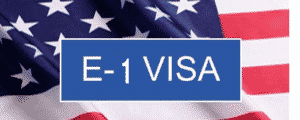E1 Treaty Trader Qualifications
General Qualifications of a Treaty Trader Investor
To qualify for E-1 classification, the treaty trader must:
- Be a national of a country with which the United States maintains a treaty of commerce and navigation
- Carry on substantial trade
- Carry on principal trade between the United States and the treaty country which qualified the treaty trader for E-1 classification.
Trade is the existing international exchange of items of trade for consideration between the United States and the treaty country. Items of trade include but are not limited to:
- Goods
- Services
- International banking
- Insurance
- Transportation
- Tourism
- Technology and its transfer
- Some news-gathering activities.
See 8 CFR 214.2(e)(9) for additional examples and discussion.
Substantial trade generally refers to the continuous flow of sizable international trade items, involving numerous transactions over time. There is no minimum requirement regarding the monetary value or volume of each transaction. While monetary value of transactions is an important factor in considering substantiality, greater weight is given to more numerous exchanges of greater value. See 8 CFR 214.2(e)(10) for further details.
Principal trade between the United States and the treaty country exists when over 50% of the total volume of international trade is between the U.S. and the trader’s treaty country. See 8 CFR 214.2(e)(11).
General Qualifications of the Employee of a Treaty Trader
To qualify for E-1 classification, the employee of a treaty trader must:
- Be the same nationality of the principal alien employer (who must have the nationality of the treaty country)
- Meet the definition of “employee” under the relevant law
- Either be engaging in duties of an executive or supervisory character, or if employed in a lesser capacity, have special qualifications.
If the principal alien employer is not an individual, it must be an enterprise or organization at least 50% owned by persons in the United States who have the nationality of the treaty country. These owners must be maintaining nonimmigrant treaty trader status. If the owners are not in the United States, they must be, if they were to seek admission to this country, classifiable as nonimmigrant treaty traders. See 8 CFR 214.2(e)(3)(ii).
Duties which are of an executive or supervisory character are those which primarily provide the employee ultimate control and responsibility for the organization’s overall operation, or a major component of it. See 8 CFR 214.2(e)(17) for a more complete definition.
Special qualifications are skills which make the employee’s services essential to the efficient operation of the business. There are several qualities or circumstances which could, depending on the facts, meet this requirement. These include, but are not limited to:
- The degree of proven expertise in the employee’s area of operations
- Whether others possess the employee’s specific skills
- The salary that the special qualifications can command
- Whether the skills and qualifications are readily available in the United States
Knowledge of a foreign language and culture does not, by itself, meet this requirement. Note that in some cases a skill that is essential at one point in time may become commonplace, and therefore no longer qualifying, at a later date. See 8 CFR 214.2(e)(18) for a more complete definition.
